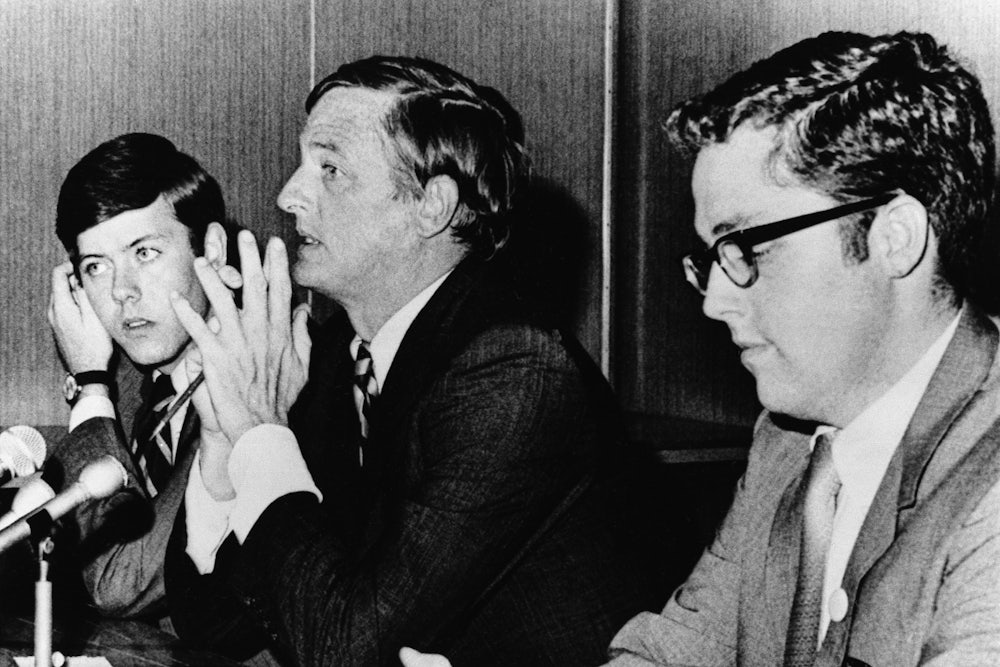The Atlantic’s firing of writer Kevin Williamson, just two weeks after he joined the magazine from National Review, has triggered outrage throughout conservative media. Reason magazine editor in chief Katherine Mangu-Ward argued that the firing shows The Atlantic “can’t handle real ideological diversity,” while National Review’s David French lamented, “The Atlantic has caved to the intolerant mob and fired Kevin Williamson, and in so doing has contributed to a slanderous fiction—that Kevin is so beyond the pale that he has no place at one of the nation’s premiere mainstream publications.”
These arguments shy away from an important question: Do magazines of opinion have the right to fire writers of extremist views? Williamson was fired over his belief, expressed in a 2014 tweet, that women who have abortions should be punished by “hanging.” (This was known before he was hired, but Media Matters this week surfaced a 2014 podcast in which Williamson articulated the same view, which proved too much for Atlantic editor in chief Jeffrey Goldberg.) Few of Williamson’s defenders agree with that view. “Sure, he can troll a little bit, and—no—I don’t agree with everything he says,” French wrote. “I’m a moderate, you see. If abortion is ever criminalized in this nation, I think only the abortionist (and not the mother) should face murder charges for poisoning, crushing, or dismembering a living child.”
But if Williamson’s abortion stance is extreme even by conservative standards, then isn’t it well within the rights of The Atlantic, a historically liberal magazine that has a centrist bent today, to fire him over it? In fact, if The Atlantic is looking for a precedent for its decision, it could point to National Review itself, which has a long history of purging writers and editors for transgressions on par with Williamson’s.
I think "why doesn't National Review publish liberals" is a pretty bad Kevin Williamson take.
— Matthew Gertz (@MattGertz) April 6, 2018
Here's a better one: "why doesn't National Review publish John Derbyshire anymore?"
That’s a good question. Derbyshire was a longtime columnist for National Review when, in 2012, he wrote an article for Taki’s Magazine that gave recommendations for what “nonblack Americans” should tell their kids, including: “Avoid concentrations of blacks not all known to you personally. Stay out of heavily black neighborhoods.” Gertz, a senior fellow at Media Matters, noted that National Review “explicitly fired Derbyshire over his views,” and pointed to an announcement of the decision by editor Rich Lowry that reads: “Needless to say, no one at National Review shares Derb’s appalling view of what parents supposedly should tell their kids about blacks in this instantly notorious piece here.”
Derbyshire is only one of many writers expelled by National Review, a magazine which, since its founding by William F. Buckley in 1955, has seen itself as policing ideological discourse on the political right.
In the early days of National Review, the magazine occasionally published anti-war libertarians like John T. Flynn and Murray Rothbard (who also helped Buckley with his 1957 book Up from Liberalism). But Flynn and Rothbard were Cold War doves who believed that the militarization of America was as serious a threat as the welfare state. This put them at odds with National Review hawkish stance on foreign policy; co-founder L. Brent Bozell Jr., for instance, once said that the U.S. may have an “obligation” to launch a pre-emptive nuclear war against the Soviet Union. By the late 1950s, Flynn and Rothbard found they were no longer welcome in the pages of National Review.
While the purge of libertarian doves like Flynn and Rothbard was dubious, Buckley’s National Review was widely and rightly praised for helping to marginalize anti-Semites. In the early 1960s, National Review also became increasingly critical of the conspiracy-obsessed John Birch Society, finally condemning the organization in 1965 when it came out against the Vietnam War (which it saw an an elite deception). The feud with the Birch Society led National Review to sever ties with various writers, including Revilo Oliver, a frequent National Review contributor. Oliver would later be purged from the John Birch Society itself and become one of America’s leading white nationalist thinkers.
For Murray Rothbard, the history of National Review was largely a story of exclusion. “And so the purges began,” Rothbard recounted in a 1992 article. “One after another, Buckley and the National Review purged and excommunicated all the radicals, all the nonrespectables. Consider the roll call: isolationists (such as John T. Flynn), anti-Zionists, libertarians, Ayn Randians, the John Birch Society, and all those who continued, like the early National Review, to dare to oppose Martin Luther King and the civil-rights revolution after Buckley had changed and decided to embrace it.”
That policy of excommunication continued to the present. Over the years, the magazine has fired or stopped publishing figures like Joseph Sobran (an editor who should have been fired for his anti-Semitism and racism but was not let go until criticizing Buckley in 1993), Peter Brimelow (an editor who was excessively anti-immigrant) and Ann Coulter (who was fired in 2001 after writing a column arguing saying that the United States should “invade [Muslim] countries, kill their leaders and convert them to Christianity”).
Some of these firings were more justified than others, and still other writers have managed to hold onto their job at National Review despite extremely controversial views. For instance, why fire Derbyshire but continue to publish Jason Richwine, who resigned from the Heritage Foundation in 2013 after revelations he wrote a racist dissertation? (“No one knows whether Hispanics will ever reach IQ parity with whites,” Richwine wrote, adding that “the low average IQ of Hispanics is effectively permanent.”) Still, the underlying principle is clear: National Review feels that as a magazine of opinion, it has the right to act as an intellectual gatekeeper and to fire writers over objectionable beliefs. The Atlantic apparently feels the same.
